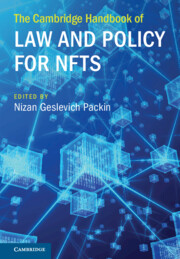Book contents
- The Cambridge Handbook of Law and Policy for NFTs
- The Cambridge Handbook of Law and Policy for NFTs
- Copyright page
- Dedication
- Contents
- Figures
- Tables
- Contributors
- Acknowledgments
- Part I Introduction and Background
- Part II Financial Regulation and Investor Protection
- 3 The Economic Reality of NFT Securities
- 4 Digital Assets, Anti-Money Laundering, and Counter Financing of Terrorism
- 5 NFTs and State Laws Governing Securities Regulation, Virtual Currency, and Money Transmission
- 6 New Tax-Reporting Rules for a New Class of Digital Assets?
- Part III Capital Markets, Community, and Marketing
- Part IV Intellectual Property and Ownership Rights
- Part V Data Protection, Privacy, Cybersecurity, and NFTs
- Part VI Other Legal Issues with NFTs
- Part VII Conclusions and Future Directions
- Index
6 - New Tax-Reporting Rules for a New Class of Digital Assets?
from Part II - Financial Regulation and Investor Protection
Published online by Cambridge University Press: 02 November 2024
- The Cambridge Handbook of Law and Policy for NFTs
- The Cambridge Handbook of Law and Policy for NFTs
- Copyright page
- Dedication
- Contents
- Figures
- Tables
- Contributors
- Acknowledgments
- Part I Introduction and Background
- Part II Financial Regulation and Investor Protection
- 3 The Economic Reality of NFT Securities
- 4 Digital Assets, Anti-Money Laundering, and Counter Financing of Terrorism
- 5 NFTs and State Laws Governing Securities Regulation, Virtual Currency, and Money Transmission
- 6 New Tax-Reporting Rules for a New Class of Digital Assets?
- Part III Capital Markets, Community, and Marketing
- Part IV Intellectual Property and Ownership Rights
- Part V Data Protection, Privacy, Cybersecurity, and NFTs
- Part VI Other Legal Issues with NFTs
- Part VII Conclusions and Future Directions
- Index
Summary
The digital asset landscape is rapidly evolving, despite recent volatility exemplified by the collapse of FTX in 2022. However, the taxation of cryptocurrencies remains a contentious topic, raising questions about how these financial instruments should be taxed. While the IRS has not signaled any immediate changes to the tax code, arguments persist for new tax specifics. This chapter presents the case for integrating fresh tax regulations into the code, catering to both academics and practitioners. Exploring the complexities of taxing cryptocurrencies, it considers factors such as classifying tax liabilities for various digital assets and understanding the implications of crypto transactions on taxable events, and delves into the challenges faced by tax authorities in monitoring decentralized and pseudonymous cryptocurrency transactions. With a focus on bridging theory and practice, the chapter offers practical insights for implementing effective taxation policies for digital assets. It aims to guide policy-makers and taxpayers in navigating the dynamic cryptocurrency landscape. Additionally, it advocates for an updated tax code that aligns with the evolving nature of the digital asset ecosystem. By providing a comprehensive economic rationale, it contributes to ongoing discussions on cryptocurrency taxation, fostering an efficient and equitable tax framework tailored for NFTs and digital assets.
- Type
- Chapter
- Information
- The Cambridge Handbook of Law and Policy for NFTs , pp. 118 - 136Publisher: Cambridge University PressPrint publication year: 2024

